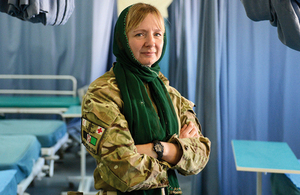Women in the Forces
In celebration of International Women’s Day on 8 March, meet a female reservist who has seen service in Afghanistan.

Reservist Captain Lisa Irwin in an Afghan National Army hospital in Camp Shorabak [Picture: Sergeant Dan Bardsley RLC, Crown copyright]
The reserve forces are a valued part of the UK military and their contribution is increasing significantly. Captain Lisa Irwin joined the Army Reserve after her interest was sparked at a freshers’ week she attended at university in Cardiff.
Although her father was in the Royal Air Force, Lisa decided to join the Army Reserve because of her interest in all things mechanical. She took the plunge after visiting a recruitment centre and signed up to the Royal Electrical and Mechanical Engineers in 1986.
Lisa, who in her civilian life is an NHS paediatric nurse, is currently in Afghanistan on her third Operation Herrick tour and is filling the role of cultural specialist.
The post is all about building relationships with locals and community leaders, and feeding back to her commander pertinent information that could affect operations.
Although Afghanistan is still a very male-dominated society, this does not limit the roles that women reservists can undertake on operations there.
Lisa explained:
In the Defence Cultural Specialist Unit there are quite a lot of females because it doesn’t really matter whether you are male or female, we can all do the job.
You just need to have an ability to learn a language and engage with local nationals and leaders in whatever area you’re working in.
Lisa studied Pashtu and Dari for 15 months which has enabled her to engage in conversation with the Afghans, a skill that has proved invaluable. The most rewarding experience of her reserve career so far was in 2010/2011 when she bonded with local women in Nad ‘Ali South:
In that area I managed to bring together a group of women and give them some health education which was really good. It’s very important because in Helmand there isn’t much in the way of healthcare provision, especially for women.
I was teaching them things such as nutrition, ensuring they use clean water, and tried to help them help their families.
Being a reservist has had a positive read-across to her civilian job within the NHS. Lisa believes that developing organisational and management skills has proved useful, as has being able to work in a team and deal with challenges. She said:
I think my military career has also improved my confidence. I don’t worry about standing up and giving a presentation to a hundred people now. I think it’s a really good environment to work in with plenty of opportunities.
If you are interested in becoming a reservist, find out more about joining the reserves.